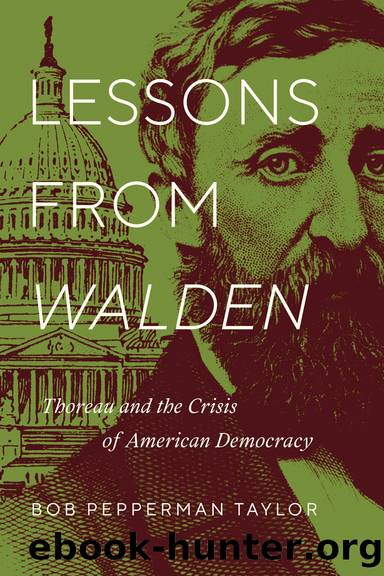Lessons From Walden by Bob Pepperman Taylor;

Author:Bob Pepperman Taylor; [Неизв.]
Language: eng
Format: epub
Publisher: Lightning Source Inc. (Tier 3)
Published: 2020-02-16T21:00:00+00:00
THE NATURAL LANDSCAPE WAS the first great resource of liberation for Europeans migrating to North America. Whether it represented a haven for purified religious practice in Massachusetts Bay or Pennsylvania, or, in other colonies, a context within which to exploit natural resources for the sake of riches, the land was the site for the colonists to pursue their dreams, to free themselves from the constraints in their homeland. This, of course, was not the case for all who were new to this continent. For those who came to the Americas in chains, the land was a prison and, as Kimberly Smith notes, was viewed ânot as pristine and innocent wilderness but as a corrupted land in need of redemption.â37 The African American tradition of environmental thinking, in Smithâs analysis, has portrayed the natural environment as scarred and distorted; only free people can have a âhealthy relationship to natureâ; natureâs potential is in a freer future, rather than the experience of the Founding.38 For those who had freely chosen their new homes in what would become the United States, however, the natural environment, for all the suffering and difficulty it presented, provided the basic ingredients and preconditions for their deepest hopes and desires. As the nineteenth-century poet would put it, the landscape represented a âsweet land of liberty.â The colonial world was not a liberal world, of course; it was not committed to individual autonomy or to what we would come to think of as the forms of modern freedom. That would come later, especially after the Revolution and, in the nineteenth century, with the growth of market society. Nonetheless, even the preliberal European forebears experienced the natural world in North America as the context within which they could enjoy a liberation from the constraints of European politics and society.
To liberate was by no means to assure the virtue of the people, however. Samuel Danforth preached a famous election day sermon in Boston in 1670, in which he reminded his audience of their special âErrand into the Wilderness,â their plan to establish a purified Christian community. Their decision to colonize âthis waste and howling Wildernessâ grew from their âLiberty to walk in the Faith of the Gospel with all good Conscience according to the Order of the Gospel, and your enjoyment of the pure Worship of God according to his Institution, without humane Mixtures and Impositions.â39 Danforthâs audience had strayed from its mission and needed to be called to resist the âPride, Contention, Worldliness, Covetousness, Luxury, Drunkenness and Uncleannessâ that âbreak in like a flood upon us.â40 His reminder was needed to bring the congregation back to the realization that the liberty they gained in New England was to be used to strive for a religious practice no longer viable in England.
To what purpose then we came into the Wilderness, and what expectation drew us hither? Was it not the expectation of the pure and faithful Dispensation of the Gospel and Kingdom of God? The times were such that we could
Download
This site does not store any files on its server. We only index and link to content provided by other sites. Please contact the content providers to delete copyright contents if any and email us, we'll remove relevant links or contents immediately.
| Anthropology | Archaeology |
| Philosophy | Politics & Government |
| Social Sciences | Sociology |
| Women's Studies |
The Leavers by Lisa Ko(6473)
Born to Run: by Christopher McDougall(6260)
iGen by Jean M. Twenge(4702)
Sapiens by Yuval Noah Harari(4537)
The Kite Runner by Khaled Hosseini(4435)
Spare by Prince Harry The Duke of Sussex(4195)
Bullshit Jobs by David Graeber(3179)
Livewired by David Eagleman(3122)
Goodbye Paradise(2963)
Never by Ken Follett(2880)
A Dictionary of Sociology by Unknown(2518)
Harry Potter 4 - Harry Potter and The Goblet of Fire by J.K.Rowling(2416)
The Club by A.L. Brooks(2360)
People of the Earth: An Introduction to World Prehistory by Dr. Brian Fagan & Nadia Durrani(2346)
The Social Psychology of Inequality by Unknown(2310)
Machine Learning at Scale with H2O by Gregory Keys | David Whiting(2291)
Harry Potter and the Order of the Phoenix (5) by J.K. Rowling(2227)
0041152001443424520 .pdf by Unknown(2220)
Don't Sleep, There Are Snakes by Daniel L. Everett(2216)
